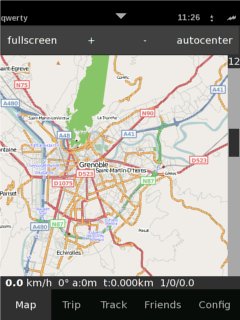Open source phone gains “fat” distro
Dec 1, 2008 — by Eric Brown — from the LinuxDevices Archive — 2 views Barcelona, Spain-based Tuxbrain has released an application-rich Linux distribution for the Openmoko Neo FreeRunner phone called Fat and Dirty OpenMoko (FDOM). In addition, Openmoko announced that both Tuxbrain and French design firm FaberNovel have joined the company's network of more than 20 distributors.
Barcelona, Spain-based Tuxbrain has released an application-rich Linux distribution for the Openmoko Neo FreeRunner phone called Fat and Dirty OpenMoko (FDOM). In addition, Openmoko announced that both Tuxbrain and French design firm FaberNovel have joined the company's network of more than 20 distributors.
(Click for larger view of FDOM interface)
Based on the Openmoko Neo FreeRunner's baseline Openmoko 2008.9 Linux distribution, FDOM is available in an alpha 3 release. It supports 57 applications, including the Mozilla-based Minimo browser, TangoGPS mapping, and a variety of graphics apps and games, says Tuxbrain (see software highlights farther below).
FDOM is aimed primarily at demonstration applications, such as those required for Tuxbrain's own distribution efforts, says the company. Tuxbrain co-founders David Samblas and Victor Remolina began developing the distribution after signing up the company with Openmoko's Group Sales program in July. The program enables community members to coordinate purchases online and receive discounted prices. Aiming to start a full-fledged distribution business for the open source phone, they developed FDOM and founded the Openmoko-Spain community list and wiki.

TangoGPS on FDOM
FDOM joins a growing list of phone stacks available for the FreeRunner. In addition to the default Openmoko 2008.9, which uses the Gnome/GTK+ stack, there's a newer April Software Update (ASU) stack based on Qt Software's Qt for Embedded (formerly Qtopia), as well as a FreeSmartphone.org (FSO) framework initiative, which is still fairly early in the development process. In addition, Canadian development firm Koolu is porting the Google Android stack to the FreeRunner, and plans to sell a pre-integrated Android version of the phone.
 FDOM logo (Click to enlarge) |
Tuxbrain bills FDOM as “a combination of apps and fixes to demo the capabilities of the Freerunner and to have a functional phone (sort of).” The distribution offers a KDE environment, and can be updated through official Openmoko 2008.9 feeds, says Tuxbrain.
Some of the key applications available with KDOM are said to include:
- Tap / Untap — for switching screen orientation
- Calendar, contacts, and dialer — productivity
- TangoGPS — GPS mapping
- GPS Test — tests GPS
- Gesture — gesture recognition via the dual accelerometers
- Media player — audio and video player
- Messages — SMS text messaging
- Minimo — web browser based on Mozilla
- Pidgin — instant messaging
- ReMoko — remote access
- Services — communications utility
- Settings — phone settings
- Sudoku — game
- Terminal — Linux command line
- Wifi Mofi — WiFi set-up
- Numptyphysics — game
- Omview — touch-enabled image viewer
- Orrery — a small planetarium
The other new FreeRunner distributor, FaberNovel, is a Parisian design firm that is distributing the Neo FreeRunner in the U. S. via its San Francisco office. FaberNovel decided to work with Openmoko after its Paris-based technical partner, Bearstech, began developing two Neo FreeRunner distributions of its own. Available in early alpha, the distros include hackable:1, a Debian/Gnome implementation, as well as a bare-bones distribution called RunningBear that is designed “from the ground up,” and aimed at hackable mobile devices, says FaberNovel.
Stated Sean Moss Pultz CEO of Openmoko, “Our goal with FreeRunner, our goal with all our products, is to free creators — creators of software and creators of new businesses — and strengthen the vibrant communities that support them.”
Availability
More information on FDOM may be found on this OpenMoko wiki FAQ, as well as at Tuxbrain, which is selling the Neo FreeRunner for 350 Euros. FaberNovel's ParisSoMa page offering the phone for $400 US may be found here.
This article was originally published on LinuxDevices.com and has been donated to the open source community by QuinStreet Inc. Please visit LinuxToday.com for up-to-date news and articles about Linux and open source.